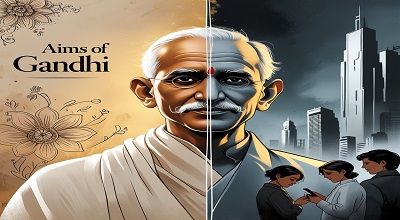Aims of Gandhi
Mahatma Gandhi—a name synonymous with non-violence, freedom, and justice—played a pivotal role in shaping modern India. His ideals, encompassing political independence, social harmony, economic self-reliance, and religious tolerance, created a roadmap for a just and equitable society. Today, as India stands as one of the fastest-growing economies and the largest democracies in the world, it is crucial to reflect on Gandhi’s vision and evaluate how closely we have adhered to his aspirations.
This blog delves into Gandhi’s core aims and contrasts them with the contemporary reality of India, assessing achievements, challenges, and the road ahead.
Gandhi’s Vision for India
1. Political Independence through Non-Violence
Gandhi’s primary goal was to achieve India’s independence from British colonial rule using non-violent resistance or Satyagraha. He believed that enduring freedom could only be achieved by rejecting violence and embracing truth and morality.
2. Economic Self-Reliance
The principle of Swadeshi, or self-reliance, was central to Gandhi’s economic vision. He emphasized local production, particularly in villages, and promoted the use of khadi (handwoven cloth) to boycott foreign goods and empower local artisans.
3. Social Equality
Gandhi aspired to build a society free of discrimination based on caste, religion, or gender. He was a strong advocate for the upliftment of Dalits, whom he referred to as “Harijans” or children of God. His campaigns sought to eradicate untouchability and promote equality.
4. Religious Harmony
Unity in diversity was a cornerstone of Gandhi’s philosophy. He believed in the peaceful coexistence of various religions and often used fasting as a method to bridge communal divides.
5. Simplicity and Ethical Living
Gandhi’s life was a testament to the principles of simplicity and self-discipline. He encouraged people to lead lives grounded in morality and service to others.
India Today: A Comparison with Gandhi’s Aims
1. Political Independence: Sustaining Democracy
While India has remained a sovereign democracy since 1947, the challenges of corruption, political polarization, and governance inefficiencies often overshadow its democratic achievements. Gandhi’s ideals of participatory democracy and moral leadership sometimes appear compromised in the current political landscape.
Achievements:
- India has conducted free and fair elections for over 75 years.
- Institutions like the judiciary and the Election Commission safeguard democratic principles.
Challenges:
- Political corruption and nepotism.
- Increasing communal polarization and erosion of civil liberties.
2. Economic Self-Reliance: From Swadeshi to Globalization
India has transitioned from an agrarian economy to a global economic powerhouse. However, this growth has not been without its drawbacks.
Achievements:
- Rapid industrialization and technological advancements.
- Emergence as a major player in the IT and pharmaceutical sectors.
Challenges:
- Growing economic disparity and rural-urban divide.
- Decline of traditional handicrafts and local industries.
3. Social Equality: Bridging Gaps
Despite constitutional safeguards, Gandhi’s dream of an egalitarian society remains a work in progress.
Achievements:
- Legal protections against caste discrimination.
- Increased representation of marginalized groups in politics and education.
Challenges:
- Persistent caste-based violence and systemic inequality.
- Gender-based discrimination and violence.
4. Religious Harmony: A Fragile Coexistence
The secular fabric of India has been strained in recent decades due to communal violence and political exploitation of religious identities.
Achievements:
- Strong legal frameworks promoting secularism.
- Efforts by civil society to foster interfaith dialogue.
Challenges:
- Rising incidents of religious intolerance.
- Political and social polarization along religious lines.
5. Simplicity and Ethical Living: Materialism vs. Minimalism
Gandhi’s advocacy for simplicity is at odds with the consumerism that dominates modern India.
Achievements:
- Environmental awareness movements echo Gandhi’s call for sustainable living.
- Growth of minimalism as a lifestyle choice among urban youth.
Challenges:
- Rampant materialism and overconsumption.
- Widening environmental degradation.
Gandhi’s Ideals in Action: Inspirational Stories
1. Community-Led Initiatives
Several grassroots movements inspired by Gandhi’s principles continue to thrive. Examples include self-help groups promoting local artisans and sustainable agriculture initiatives.
2. Prominent Leaders Advocating Gandhi’s Vision
Global figures like Nelson Mandela and Martin Luther King Jr. have drawn inspiration from Gandhi’s non-violent resistance, showcasing its universal relevance.
3. Youth Movements and NGOs
Organizations like Teach for India and Barefoot College reflect Gandhi’s ideals by empowering communities through education and self-reliance.
FAQs
1. What were Gandhi’s main goals for India?
Gandhi aimed for political independence through non-violence, economic self-reliance, social equality, religious harmony, and ethical living.
2. Is India aligned with Gandhi’s vision today?
While significant progress has been made in areas like democracy and economic growth, challenges such as inequality, communalism, and environmental degradation persist.
3. How did Gandhi promote social equality?
Gandhi fought against untouchability, advocated for women’s rights, and worked tirelessly for the upliftment of marginalized communities.
4. What role does religion play in Gandhi’s philosophy?
Gandhi believed in the peaceful coexistence of all religions and emphasized the importance of interfaith harmony.
5. What is the relevance of Gandhi’s ideas today?
Gandhi’s principles of non-violence, sustainability, and social justice are timeless and continue to inspire movements for change worldwide.
6. What can individuals do to honor Gandhi’s legacy?
By embracing values like non-violence, simplicity, and inclusivity in their daily lives, individuals can contribute to building a society closer to Gandhi’s vision.
Conclusion
Gandhi’s aspirations for India were rooted in universal values of justice, equality, and humanity. While the nation has made remarkable strides in many areas, the journey toward fully realizing his vision is far from complete. By reflecting on his ideals and addressing the gaps in their implementation, India can strive to create a future that aligns more closely with Gandhi’s timeless dreams.
As we move forward, Gandhi’s teachings remind us that true progress lies not in material achievements alone but in the collective moral and ethical growth of society.
